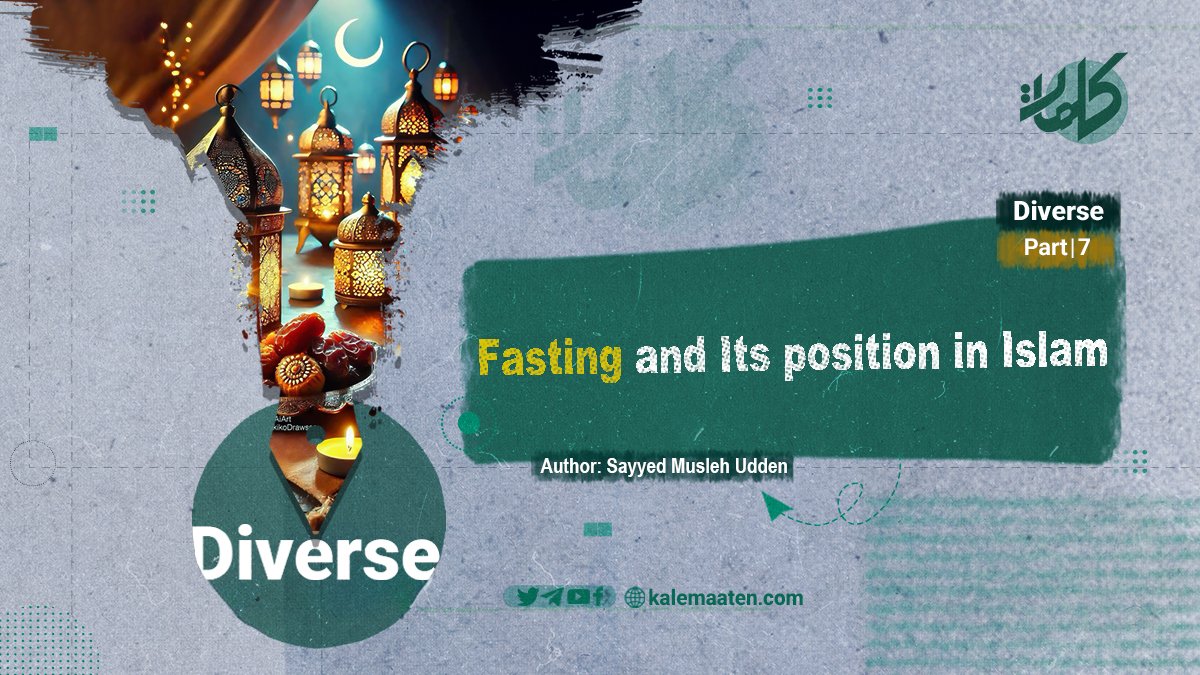
Author: Sayyed Musleh Uddin
Fasting and Its Position in Islam (Part 7)
Excessive Freedom, the Right to Choose, and the Crime Against the Purposes and Benefits of Fasting
In some earlier religions and legal systems, the days of fasting were not specified, and the beginning and end of fasting, as well as its rulings, were not defined; in those traditions, fasting is optional. In other religions, individuals have the choice between abstaining from certain foods and drinks or reducing their intake of food and water. They are commanded to avoid some foods while consuming others; for instance, in certain Hindu practices, adherents refrain from eating meat, while some avoid food cooked with fire, and others limit themselves to specific foods or saltwater.
This excessive freedom and the lack of a specific law in the past have committed a crime against the purposes of fasting, wasting its significance and weakening its efficacy. In this situation, individuals can fast whenever and however they wish, and they may choose to limit themselves to one type of food or drink during fasting while sufficing with very little. The determination of these practices has been left to the individual fasting person; consequently, people have become negligent, lazy, and unfaithful in this regard, leading them to excess and overindulgence, complicating the tracking of what they consume. It is quite possible that someone who breaks their fast might excuse themselves by claiming they had previously fasted, which no one is aware of; perhaps someone who overindulges might defend themselves by arguing that this is the little amount permitted for them to eat while fasting. Thus, fasting has been disregarded in past nations, losing its spiritual, ethical impact, and benefits. Sheikh al-Islam Ahmad ibn Abdul Rahim Dehlawi, may Allah have mercy on him, refers to this precise philosophy in determining fasting in his book Hujjatullah al-Balighah, stating: “And since a general law was needed for fasting that took into account the reform of the general public, both Arab and non-Arab, in this legislation, people should not be given the discretion to choose the month of fasting; so that they fast in whichever month is easier for them.”
This matter opens the door to excuses, justifications, and evasion of duty, closing the path of enjoining good and forbidding evil, and causing one of the greatest commandments of Islam to be forgotten. He then describes the necessity of specifying the amount of fasting: “Then the amount of fasting must be defined so that no one falls short, and no one uses a small amount that is neither beneficial nor effective for them, nor does anyone overdo it with an excessive amount that weakens their body, diminishes their vitality, exhausts their soul, and destroys them. Fasting is, in fact, an antidote to the toxins of the soul and a blow to the delicate nature of human beings; therefore, it must necessarily be established as needed.”
Reducing Food Intake: Restriction or Complete Abstinence?
Sheikh al-Islam Dehlawi, (MABH), compares two well-known methods among nations and communities. The first method involves abstaining from eating, drinking, and anything incompatible with fasting for a specific period, while the second method allows individuals to reduce their food intake or rely on just one dish while abandoning other desirable and preferred foods. He advocates for the first method based on experiences and scientific and psychological insights, stating: “Reducing eating and drinking has two methods: the first method is to suffice with only a small amount, and the second method is to extend the time interval between meals beyond the usual state. In Islam, the second method is valid; it causes weakness and fatigue, allowing a person to experience the flavor of hunger and thirst, bewildering their animal instinct and making an obvious impact on them. However, the first method gradually leads to weakness and incapacity, which a person may not readily recognize until it causes illness and disability; additionally, establishing a general law for the first method is challenging because people differ in the amount they eat. One may consume up to a pound of food, while another may eat two pounds; determining an appropriate amount for one person would result in injustice and oppression to the other.”
He continues by referencing moderation and balance in determining the time, stating: “It is then necessary that the specified duration is not oppressive or detrimental to the body, such as fasting for three consecutive nights; because this contradicts the structure of Shariah, and most people are unable to adhere to it.”
Consecutive Fasting or Scattered Fasting?
In many religions and historical societies, fasting days are scattered throughout the year, with long intervals between them, ultimately diminishing fasting’s impact on ethics and habits. As a result, a person cannot be influenced by it or acclimate to fasting. Therefore, reason and wisdom dictate that fasting days should be consecutive and continuous.
Sheikh al-Islam Dehlawi, may Allah have mercy on him, remarks: “It is necessary for the fasting days to be consecutive and continuous so that the soul becomes accustomed to them and accepts them. Otherwise, facing hunger just once, no matter how long or difficult it may be, what benefit does it provide?”
The law of fasting in Islamic Shariah encompasses these conditions and characteristics, fulfilling all spiritual, ethical, and social goals. This legislation is embodied in the Ramadan fast, which Allah Almighty has made obligatory for Muslims. Before the obligation of Ramadan, there was the fast of Ashura, which was observed by the Jews and many Arabs of Hijaz. This subject requires further explanation and clarification.
Continues…
[1]. The great leader of India, Gandhi, observed fasting in this manner, and some of the protesters and opposition leaders also follow him, referring to this fast as “Bert.”
[2]. Hujjatullah al-Balighah, vol. 2, p. 37.
[3]. Hujjatullah al-Balighah, vol. 2, p. 36.
[4]. Hujjatullah al-Balighah, vol. 2, p. 37.
[5]. Same source, p. 31.
[6]. Same, p. 37.


